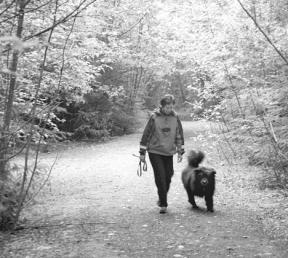Six hundred acres of forest land near Goss Lake could become a county park if the state can find the money to afford giving it away.
If it does, it will become part of the largest county-owned hiking and recreation area on the island.
The acreage, which is owned by the Department of Natural Resources, is currently on the DNR’s Trust Land Transfer Program list. The state’s Board of Natural Resources will decide June 3 whether to use money given to DNR by the Legislature to transfer the acreage to Island County, to place a 30-year cutting ban on the land, or to remove the woods from the transfer program and make it eligible for cutting.
Pat Powell, the executive director of the Whidbey Camano Land Trust, said this week she worries the land could be sold, subdivided and harvested if it is not transferred to the county.
“The money is here now, in 20 years there may not be any money,” said Powell.
Temporarily spared logging by legislation championed by former state Rep. Kelly Barlean, the land’s future as an uncut forest would become certain if ownership is transferred to Island County.
Barlean did work during his four years with the legislature to find enough money to transfer the ownership of the woods to the county. He did manage to get it onto a transfer list, but was unsuccessful during his two terms to see it become county property.
The Board of Island County Commissioners supports the transfer. On Friday, the board sent a letter to the DNR requesting the transfer on behalf of Island County citizens.
Currently part of the state’s Common School Construction Trust, the forest land is intended to be used to generate money for building schools. The DNR logs the 1.8 million acres of land in the trust on a regular basis and the profits go to schools.
According to Pat Powell, the executive director of the Whidbey Camano Land Trust, the the trust — which was started in the late 1800s — produces just a part of the monies needed for school construction.
Powell said Whidbey Islanders, through Barlean and directly, pressured the state to keep the Goss Lake land off the logging list. Part of the reason the DNR has placed it on the transfer list is because making a profit off the trees there would be difficult due to the public outcry it would cause.
Powell was able to speak with authority on the subject, since she used to work for the state and specifically on the Common School Construction Trust.
According to information on The Nature Conservancy Web site, DNR lands with high ecological, scenic or recreational significance — as Goss Lake woods fans advocate — can be removed from the trust because when deemed unproductive. To transfer the land, the DNR will appraise its timber and land, then deposit 80 to 90 percent of the timber value into the school construction account. That money has already be pulled out of the state’s general fund, but is not guaranteed to go to the Goss Lake woods. There are two other properties on the transfer list and the DNR is running out of money to make transfers.
The land would then be deeded over to Island County. To be compensated for the land value, DNR would also use general fund money. The agency would then spend the money to purchase new resource lands.
Evert Challstedt, a spokesperson for the DNR, said this week that the state’s Board of Natural Resources is scheduled to meet June 3 to decide what to do with the Goss Lake woods. He refused to discuss the value of the land and timber, saying an appraisal hasn’t been completed for the land.
That information, he said, will be given to commissioners at the June 3 meeting.
Challstedt said Friday the DNR has no plans to sell the Goss Lake woods for logging if the property transfer doesn’t happen. He said there are five properties in Washington eligible for transfer, including 402 acres on Camano Island near Carp Lake. The Board of Island County Commissioners has also endorsed that transfer.
“We have no plans to do that with any of these properties,” Challstedt said of the potential for logging.
He also noted that not all five properties will be transferred.
“There won’t be enough money to transfer all the property in Washington,” said Challstedt.
The 600 acres boasts an extensive trail system that connects to the Saratoga Woods and Metcalf Trust trails. They are recognized by the DNR as non-motorized trails, and have a rare plant community of evergreen huckleberry.
The 118-acre Saratoga Woods is already a county park, having been purchased and donated by private citizens in 2001.
Kirk Francis, a Langley-area resident who is the organizer of the Friends of Goss Lake, said the DNR woods are an invaluable resource for hikers, equestrians and cyclists on Whidbey Island.
Both he and Powell are asking islanders to write letters supporting the transfer to the DNR in time to meet a May 8 comment deadline.



